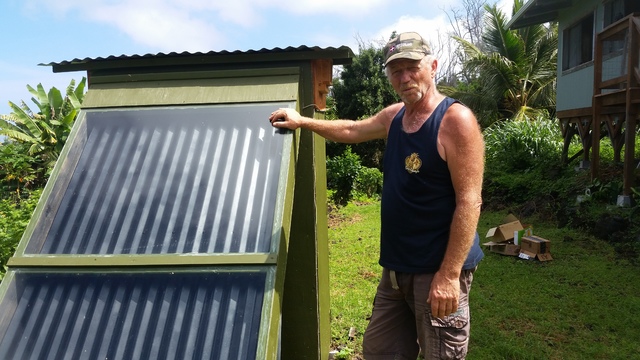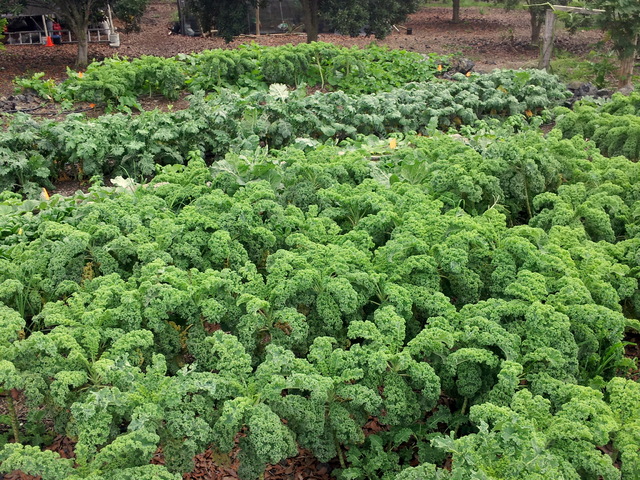On my recent visit with Doug Pittman at his Kona Hawk Farm, he suggested we start our tour by looking at the “dark side” of his operation. This meant walking through his process of turning farm waste into fertilizer for his plants and methane gas to power his fruit dryer. This is just one of the many ways that Doug is creating what he calls an “ark”: a totally self-sufficient piece of property on 5 acres in South Kona.
On my recent visit with Doug Pittman at his Kona Hawk Farm, he suggested we start our tour by looking at the “dark side” of his operation. This meant walking through his process of turning farm waste into fertilizer for his plants and methane gas to power his fruit dryer. This is just one of the many ways that Doug is creating what he calls an “ark”: a totally self-sufficient piece of property on 5 acres in South Kona.
From his experiences on the mainland setting up solar systems, he was able to get his property completely off the grid shortly after moving there in 2004. Although they occasionally buy water during droughts, Doug and his wife, Sabina, find that the rain water they catch is usually sufficient. After 10 years of generating power with solar panels and a small wind mill, Doug is looking at eventually creating enough methane gas with on-site inputs to replace the propane they use for cooking. Beyond his desire to be able to provide energy sustainably, Doug has set up many systems on his farm using on-site and renewable resources.
Doug’s relationship with Hawaii has been a long one. In 1982, his job as a corporate trainer brought him to Oahu. Though he worked with trainees there, he also served a wider market, including California. He eventually returned to California, settling in Sebastopol where he and Sabina lived rurally until urban growth began encroaching on them. Turning 50 was a watershed for Doug. “I needed to get further from ‘civilization’ and finding a place in rural Hawaii seemed the best way to do that.”
The property in Kona that Doug and Sabina bought was planted with 140 macadamia nut and 40 avocado trees. The orchards were almost bare rock from years of Roundup application and the trees were struggling. From his California experiences tending a half-acre kitchen garden, Doug had learned some valuable lessons on soil building and organic growing. He has never used herbicides in his orchards. He lets the grass and weeds grow, mows or whacks them down and leaves them as mulch. He also recycles his mac nuts hulls for mulch and composts garden and kitchen waste to add microbes and fertility to the soil. Though he did lose about a dozen avocado trees in a recent drought, today his remaining trees are healthy, thriving and highly productive.
Wanting to expand his operation in 2007, Doug decided to try his hand at chicken farming. Starting with 400 chicks, he was soon producing about 90 dozen eggs a week to sell at his booth at the Saturday Keauhou Farmers Market. His eggs were in high demand and he often sold out well before the noon closing. When customers started getting mad when he ran out of eggs, he found he had to remind them; “I’m a farm, not a factory.” When the drought made growing on-farm chicken feed became more difficult, Doug decided to give up the egg business and avoid becoming a factory.
Always with an eye on becoming more sustainable as our climate changes, Doug decided to grow dragon fruit. The plant is a cactus and very drought tolerant. Dragon fruit became his crop for dry times. When the rains started to return, Doug realized he could probably maintain a small garden area and grow greens again. He is a big fan of all the kale varieties, as well as collard greens and mustards. These he also markets and sells out weekly. Problems began to arise in his small garden, however. Birds discovered the delicious greens and began feeding on their leaves. That and an infestation of white rust disease began making his crop unsaleable.
Ever the optimistic experimenter, Doug started researching a crop that might avoid these problems and be less labor intensive. Noting the increasing evidence in medical benefits from consuming turmeric, he decided to try growing this Hawaiian heritage plant. So far he has had great production and can sell the product fresh and as a dried powder. Either way, research has shown that it has great anti-inflammatory benefits as well as being a strong antioxidant. Many websites are available with information on the uses of turmeric beyond its traditional use to flavor and color curries. Doug is also a willing information source on turmeric’s many benefits. Just ask any Saturday at the Keauhou Market.
Doug is constantly discovering new ways to meet his plants’ needs without spending time and money on off-site inputs. His biodigester system is definitely part of the ongoing process toward achieving “ark-dom.” Using chicken manure from his currently small flock and mixing it with water and his garden and kitchen waste, he can strain a power-packed microbial slurry to put into his biodigester. The product of the process is a concentrated liquid fertilizer that he dilutes in vats of weeds and water in preparation for applying in his orchards through a series of irrigation hoses. In addition to the fertilizer, this system also traps the resultant methane gas, which he is using instead of propane to power his fruit dryer. Doug is excited about this sustainable new system. “It feels great knowing that our farm waste is generating many of the products we need in only 30 minutes a day.”
Before getting his biodigester going, Doug was using several creative on-site organic methods for adding fertility. I noticed several comfrey plants sprinkled throughout his garden. Not only does the comfrey plant attract beneficial insects but the leaves are a great natural source of the nutrients plants need. Doug cuts the leaves and throws them in his rows of greens. He also interplants his greens with beans. He eats the beans while the plants draw nitrogen from the air and sequester it in the soil.
Though Doug can maintain the farm himself he often finds help through WWOOF, which is a worldwide program offering people a chance to live and work on organic farms. Doug’s son, Derek, also lives on the farm and is another firm believer in organic production using local products. He is a partner in the Hawaiian Ola company that produces canned sparkling drinks containing Hawaii-grown crops like noni, turmeric and ginger. The healthful energy drinks are available in most local groceries and health food stores.
Doug and Sabina have been regulars at the Kona Farm Bureau’s Keauhou Saturday Market for the past 10 years. With his ever-evolving list of crops, Doug provides the produce for the booth. Sabina is an award-winning baker who makes a dozen loaves of organic sour dough bread every week, half a dozen banana breads and an assortment of delicious cookies and brownies. Her Kona coffee brownie with mac nuts took second place in the annual coffee festival bake off in 2010. Be sure to try one if you get to the market before they are all gone.
Doug describes his process as staying flexible and taking the path of least resistance. He says, “I am constantly trying to find what works best and have to be willing to change if I find something that might be better.” He feels farming in Hawaii has taught him patience and a willingness to live with imperfection. “Change happens and I have to believe that I’ll find a way to adapt to whatever the future holds.” He finds he is now more comfortable understanding that he can’t control everything. Through his experiences farming, Doug has found a way to live with being overwhelmed while still refusing to be overworked. Not bad for a guy who continues to make huge strides toward farming sustainably. We can all learn from his example.
Duff is a plant adviser, educator and consultant living on an organic farm in Captain Cook.


